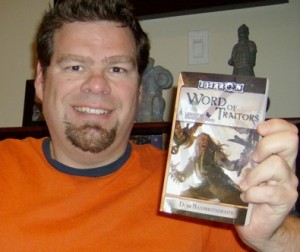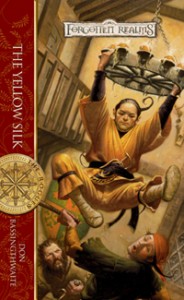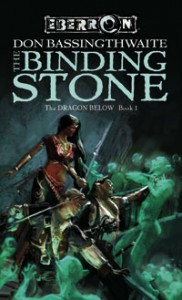 When I was reading the excellent Eberron novel The Word of Traitors I discovered that the book’s author, Don Bassingthwaite, lives in my hometown of Toronto. I sent Don an email and asked him if he’d like to do an interview for Dungeon’s Master and he said yes. A couple of weeks later I had the pleasure of sitting down with Don at a local Starbucks where we discussed his road to success as a writer for Wizards of the Coast.
When I was reading the excellent Eberron novel The Word of Traitors I discovered that the book’s author, Don Bassingthwaite, lives in my hometown of Toronto. I sent Don an email and asked him if he’d like to do an interview for Dungeon’s Master and he said yes. A couple of weeks later I had the pleasure of sitting down with Don at a local Starbucks where we discussed his road to success as a writer for Wizards of the Coast.
Although the interview will be presented in print and in multiple parts, when we’re finished we’ll make the complete interview available as an audio download.
Before we get started I think it’s only fair to give a shout out to Don himself. You can read all about Don and follow him at his own website DBassingthwaite.com. You can also visit the Don Bassingthwaite page at Wizards of the Coast. It has a mini bio as wells as a list of the Forgotten Realms and Eberron books he’s written. They also provide sample chapters of his recent works for download.
Interview – Part 1
Tell me a little bit about yourself.
I’m from a small town called Meaford, Ontario. I currently live and work in Toronto. My background is in anthropology and I have a degree in museum studies. Anthropology is a great background for fantasy writing, museum studies much less so.
How did you break into the writing business? When did you fist consider yourself a professional writer?
I considered myself a professional writer after my first sale. I thought “Now that I’ve made money from it I must be a professional.” I was 22.
I sold my first story the same year I started grad school. I was lucky because during my second year of grad school I was offered my first novel contract. My professors were very understanding and let me skip a few deadlines. I got the novel written while I was still going to school full time. I got published and I broke in.
The very first story I submitted was for Dragon magazine back in the late 80s. It was never published. It was my first submission and it got rejected. After that White Wolf published their own magazine. The carried stories set in game worlds so I wrote a story set in their Vampire the Masquerade world and submitted it to them. They liked it so much that they decided to use it as a mood setting piece in a role-playing game book.
So from there I just kept badgering them. I’d ask them “Do you want more short stories, let me know.” They started publishing anthologies and I sold one of those to them. I said “If you ever do novels let me know.” I kept on them and eventually got some novel contracts with them. That’s essentially how I broke into writing – persistence.
How did you end up working for Wizards of the Coast?
I had stopped writing for White Wolf at that point and I had made some contact with Wizards of the Coast. This was at a time when Wizards was publishing a game called Alternity, a science fiction RPG. One of their first settings for it was a space opera setting called Star*Drive. I thought “I really want to try writing that. I’ll get in touch with them and see if their interested.” They weren’t interested in anything for Star*Drive.
I sent in an outline just to see, but shortly after – while I was still talking to them – they announced their second Alternity setting which was called Dark Matter. It was sort of an X-Files-like, conspiracy, dark fantasy setting. And because of my background with White Wolf’s World of Darkness I said “I’m the perfect person to write for this.” So I pitched them and I got it. I had the second book in the Dark Matter series (If Whispers Call). I wrote that and the fifth book (By Dust Consumed). It was sort of a television series format, the same characters were featured through all the books.
Just as I turned in the fifth book they cancelled the line. This was about the time D&D 3.5e was coming out. Wizards was focusing all their efforts on that. Alternity fell by the wayside and Dark Matter along with it. The fifth book was never published but was briefly available in electronic format for download. It disappeared very quickly. It was only available for about 6 months.
I still get emails, at least one a month, from people who have found the Dark Matter books in used book stores and are looking for that mystery fifth book. I have asked Wizards if I can make it available, but Wizards of the Coast retains the intellectual property rights on it. They have very reasonably said “No, we want to hold it back in case anything ever happens.” Maybe, eventually, somewhere down the road they’ll want to revive it and very sensibly they want to keep control of it.
Dark Matter is a mystery to most people but I’m just impressed that people are still picking it up even though the series was published in 2000. I’m amazed people are really into it.
 What was the first D&D story you wrote for Wizards?
What was the first D&D story you wrote for Wizards?
The Yellow Silk, which was a Forgotten Realms novel.
Did you pitch The Yellow Silk to Wizards or did they approach you?
I let them know I was really interested in working with them again. I liked working with them on Dark Matter they liked working with me. I said “I want to work with you more” and when something opened up they came to me and said “Hey, why don’t you do this.”
It was during the period when they were doing a series of books based on the classes. The Yellow Silk is book 4 in the Rogues series. The first three dealt with various kinds of thieves and the fourth (mine) was actually a bard as the main character.
When you’re writing in a shared setting (like Forgotten Realms or Eberron) where someone else has created the world, how much direction do you get from Wizards of the Coast? How restrictive are they?
It really depends. It constantly changes from project to project. Usually the way it works is that you initially come to them with a proposal. Chances are that proposal, your introductory one, is not going to happen. They have to consider what all the other writers are working on, what works with their line, and the direction they want it to take. But when they give me an assignment – and usually it comes down to saying “What have you got? I’m up for something.” – they will say “We’ve got this sort of focus or that sort of focus.”
With The Yellow Silk they said “We’ve got this book; and it needs to be about a bard; and we want you to set it in this particular location because that hasn’t been done before and we’re interested in something there; and it has to have the colour yellow in the title because that’s part of the theme for this series.”
When it came time to write the Eberron books, there’s a little bit of a back-story. I was working with the same editor I worked with on the Dark Matter line. We were chatting back and forth when the Wizards of the Coast setting search contest was going on. The setting search eventually resulted in Keith Baker winning and Eberron coming out. I got in touch with my editor and said “You know, funny coincidence, there’s some great stuff in Eberron that I’ve heard about that overlaps with some stuff I had in my entry for the setting search. I would be really keen to write something for Eberron. Keith Baker created a great setting and I really would love to do it.”
 That resulted in me getting the opportunity to write The Binding Stone. Because it was early in the Eberron series it was pretty much carte blanche. They said “Go ahead and give use a proposal.” We went back and forth on it a bit and that’s how that one started.
That resulted in me getting the opportunity to write The Binding Stone. Because it was early in the Eberron series it was pretty much carte blanche. They said “Go ahead and give use a proposal.” We went back and forth on it a bit and that’s how that one started.
When it came time to write The Doom of Kings, the first book in the Legacy of Dhakaan, it was generated out of the R&D department at Wizards. They said “We would really like to have these events happen. We want to focus on this.” They said “We want it to start here. We want it to be about this event.” The event was the passing of power in the goblin nation of Darguun. They let me come up with a proposal.
One of the first things I said was “Can I kill the king, Lhesh Haruuc?” They said “Yeah, why not.” That’s where it started from. We picked up with some of the characters from The Dragon Below trilogy, brought them over, and sort of went from there. There’s a lot of back and forth when it comes to the specifics of the proposal. But the initial starting phase was generally pretty open.
Visit Dungeon’s Master next week when we continue our interview with Don Bassingthwaite in Part 2 and Part 3 of this series..
8 replies on “An Interview With Eberron Author Don Bassingthwaite (Part 1)”
I eagerly await the next installment.
Thanks for showing us this, it’s always cool to see these kinds of things…I should look around and see if any RPG people live near me. But I’d suck horribly at interviewing them probably. My journalism professors always told me my weakness was interviews.
.-= Wyatt´s last blog ..The Clouded Palace: Part 1 =-.
Love these interviews, can’t wait for part 2
[…] If you missed the first installment, be sure to check out An Inteview with Eberron author Don Bassingthwaite (Part 1). […]
[…] with me a while ago. They’ve got the text transcript up now — go over and have a read (part 1 | part […]
[…] the other installments, be sure to check out An Interview with Eberron author Don Bassingthwaite (Part 1) and (Part […]
[…] to impact the Eberron setting and even who he’d cast in movie versions of his books (Part 1 | Part 2 | Part […]
[…] interview below, I encourage you to check out An Interview With Eberron Author Don Bassingthwaite (Part 1 | Part 2 | Part […]